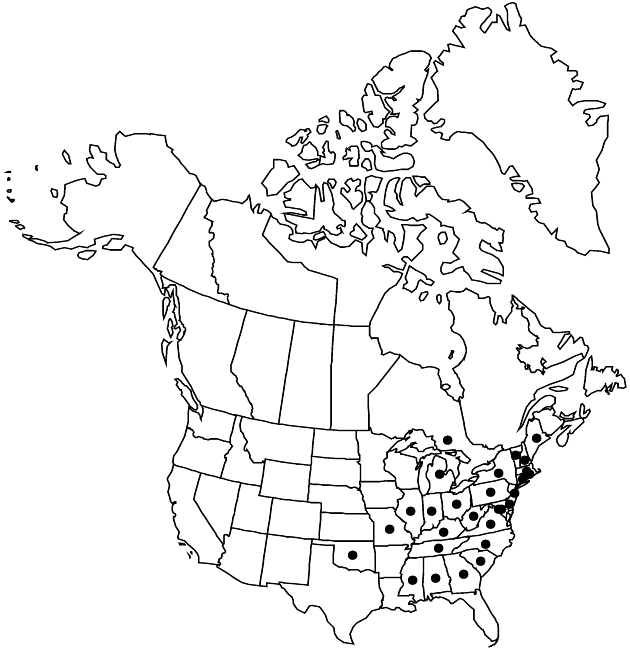Difference between revisions of "Hieracium venosum"
Sp. Pl. 2: 800. 1753.
FNA>Volume Importer |
FNA>Volume Importer |
(No difference)
| |
Revision as of 18:37, 24 September 2019
Plants ca. 45 cm. Stems proximally piloso-hirsute (hairs 1–3+ mm) to glabrate, distally usually glabrous, rarely piloso-hirsute. Leaves: basal 3–6+, cauline 0–1+; blades obovate or elliptic to oblanceolate, 40–60(–120) × 15–35(–50+) mm, lengths 2–3(–4) times widths, bases cuneate, margins usually entire, sometimes denticulate, apices rounded to acute, abaxial faces piloso-hirsute (hairs 2–5 mm) and stellate-pubescent, adaxial glabrous or piloso-hirsute (mostly near margins, hairs 2–3 mm). Heads 4–10(–20+) in corymbiform to paniculiform arrays. Peduncles usually stipitate-glandular, rarely glabrous or glabrate. Calyculi: bractlets 6–10+. Involucres obconic to campanulate, 7–9 mm. Phyllaries 12–13+, apices acute, abaxial faces usually stellate-pubescent and stipitate-glandular, rarely glabrous. Florets 30–45+; corollas yellow (sometimes pale), 7–11 mm. Cypselae (usually black, sometimes red-brown) columnar, 3–4 mm; pappi of ca. 50+, stramineous bristles in ± 2 series, 4–5 mm.
Phenology: Flowering (Apr–)May–Jul(–Sep).
Habitat: Openings in forests, sandy hillsides
Elevation: 10–300 m
Distribution

Ont., Ala., Conn., Del., D.C., Ga., Ill., Ind., Ky., Maine, Md., Mass., Mich., Miss., Mo., N.H., N.J., N.Y., N.C., Ohio, Okla., Pa., R.I., S.C., Tenn., Vt., Va., W.Va.
Discussion
Plants of Hieracium venosum with adaxial faces of leaf blades glabrous have been called var. nudicaule.
The type of Hieracium marianum Willdenow may have resulted from a cross between plants of H. venosum and H. gronovii or H. scabrum (M. L. Fernald 1943c).
Selected References
None.